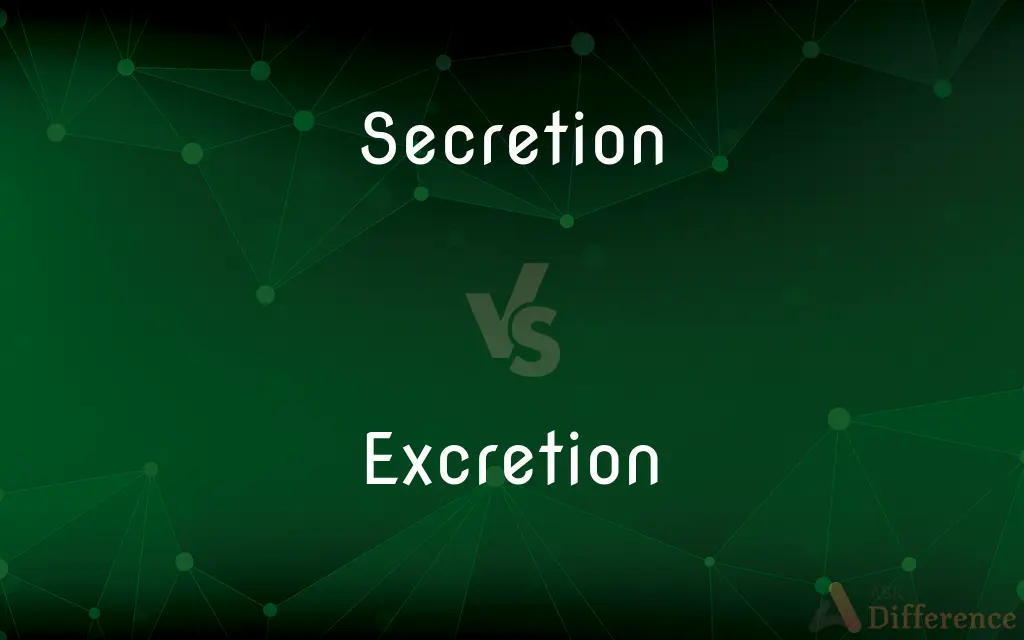Secretion vs. Excretion — What's the Difference?
Edited by Tayyaba Rehman — By Fiza Rafique — Updated on September 25, 2023
Secretion refers to the production and release of substances by cells or glands for a specific function. Excretion is the elimination of waste products from the body.

Difference Between Secretion and Excretion
Table of Contents
ADVERTISEMENT
Key Differences
Secretion is a biological process wherein cells or glands produce and release specific substances for certain functions within an organism. These substances often serve vital roles, such as hormones or enzymes. Excretion, on the other hand, is the process of eliminating waste products from the body, typically via the kidneys, lungs, or skin.
Both secretion and excretion are crucial for maintaining homeostasis, or balance, within an organism. Secretions can be enzymes that aid digestion or hormones that regulate metabolism. Excretions include waste products like urea, carbon dioxide, and toxins that must be removed to maintain health.
Secretion is generally a more specialized function that involves the production of substances that will be used elsewhere in the body or in bodily processes. Excretion is more general and focuses on removing substances that are no longer needed or could be harmful if they accumulated.
In summary, while both secretion and excretion are vital for the functioning of an organism, they serve different purposes. Secretion is about production and distribution, whereas excretion is about waste management and removal.
Comparison Chart
Purpose
Production
Elimination
ADVERTISEMENT
Usage Context
Cellular/Glandular
Bodily Systems
Types of Substances
Hormones, Enzymes
Waste Products
Example Organs
Glands, Cells
Kidneys, Lungs, Skin
Grammar
Noun
Noun
Compare with Definitions
Secretion
Essential for homeostasis in an organism.
The secretion of digestive enzymes helps break down food.
Excretion
Often involves the kidneys, lungs, or skin.
The lungs assist in the excretion of carbon dioxide.
Secretion
Generally localized and specialized.
The secretion of mucus in the respiratory tract traps foreign particles.
Excretion
Can include gaseous, liquid, or solid waste.
The excretion of feces eliminates solid waste.
Secretion
Can be hormones, enzymes, or other bioactive substances.
The secretion of neurotransmitters regulates nerve signaling.
Excretion
Elimination of waste products from the body.
The kidneys facilitate the excretion of urea.
Secretion
Production of specific substances by cells or glands.
The pancreas is responsible for the secretion of insulin.
Excretion
Crucial for maintaining health and homeostasis.
Proper excretion is essential for detoxifying the body.
Secretion
Secretion is the movement of material from one point to another, such as a secreted chemical substance from a cell or gland. In contrast, excretion, is the removal of certain substances or waste products from a cell or organism.
Excretion
A general and widespread bodily function.
The excretion of salts occurs through sweat.
Secretion
A process by which substances are produced and discharged from a cell, gland, or organ for a particular function in the organism or for excretion
Alcohol had a stimulatory effect on gastric acid secretion
Excretion
Excretion is a process in which metabolic waste is eliminated from an organism. In vertebrates this is primarily carried out by the lungs, kidneys, and skin.
Secretion
The process of secreting a substance, especially one that is not a waste, from the blood or cells
Secretion of hormones.
Secretion of milk by the mammary glands.
Excretion
(in living organisms and cells) the process of eliminating or expelling waste matter.
Secretion
A substance, such as saliva, mucus, tears, bile, or a hormone, that is secreted.
Excretion
The act or process of discharging waste matter from the blood, tissues, or organs.
Secretion
The act of concealing something in a hiding place.
Excretion
The matter, such as urine or sweat, that is so excreted.
Secretion
The act of stealing something secretly.
Excretion
The process of removing or ejecting material that has no further utility, especially from the body; the act of excreting.
Secretion
(countable) any substance that is secreted by an organism
Excretion
Something excreted in that manner, especially urine or feces.
Secretion
(uncountable) the act of secreting a substance, especially from a gland
Excretion
The act of excreting.
To promote secretion and excretion.
Secretion
The act of secreting or concealing; as, the secretion of dutiable goods.
Excretion
That which is excreted; excrement.
Secretion
The act of secreting; the process by which material is separated from the blood through the agency of the cells of the various glands and elaborated by the cells into new substances so as to form the various secretions, as the saliva, bile, and other digestive fluids. The process varies in the different glands, and hence are formed the various secretions.
Excretion
The bodily process of discharging waste matter
Secretion
Any substance or fluid secreted, or elaborated and emitted, as the gastric juice.
Excretion
Waste matter (as urine or sweat but especially feces) discharged from the body
Secretion
The organic process of synthesizing and releasing some substance
Secretion
A functionally specialized substance (especially one that is not a waste) released from a gland or cell
Secretion
Release of materials for specific functions.
Sweat glands assist in the secretion of sweat to cool the body.
Common Curiosities
What is secretion?
Secretion is the production and release of specific substances by cells or glands.
What organs are primarily responsible for excretion?
The kidneys, lungs, and skin are major organs for excretion.
Are secretions always useful to the body?
Generally, yes. Secretions often have specific functions like digestion or hormone regulation.
What's the significance of excretion?
Excretion is crucial for eliminating waste and maintaining health.
How are secretion and excretion different?
Secretion involves production, while excretion involves elimination.
What is excretion?
Excretion is the elimination of waste products from the body.
Is excretion generalized?
Yes, excretion is a general process involving multiple systems in the body.
Can excretion be harmful?
Inadequate or excessive excretion can be harmful to the body.
What types of substances are secreted?
Hormones, enzymes, and other bioactive substances are examples.
Can a substance be both secreted and excreted?
Rarely. Generally, substances are either useful and secreted, or waste and excreted.
Is secretion always internal?
Not necessarily. For example, sweat is secreted externally.
What types of waste are excreted?
Urea, carbon dioxide, and toxins are commonly excreted.
Is secretion specialized?
Yes, it's generally a specialized function performed by specific cells or glands.
What's the significance of secretion?
Secretion is essential for various bodily functions and homeostasis.
Can the terms be used interchangeably?
No, they serve different roles and shouldn't be confused.
Share Your Discovery

Previous Comparison
Greenhead vs. Horsefly
Next Comparison
Die vs. DiceAuthor Spotlight
Written by
Fiza RafiqueFiza Rafique is a skilled content writer at AskDifference.com, where she meticulously refines and enhances written pieces. Drawing from her vast editorial expertise, Fiza ensures clarity, accuracy, and precision in every article. Passionate about language, she continually seeks to elevate the quality of content for readers worldwide.
Edited by
Tayyaba RehmanTayyaba Rehman is a distinguished writer, currently serving as a primary contributor to askdifference.com. As a researcher in semantics and etymology, Tayyaba's passion for the complexity of languages and their distinctions has found a perfect home on the platform. Tayyaba delves into the intricacies of language, distinguishing between commonly confused words and phrases, thereby providing clarity for readers worldwide.















































